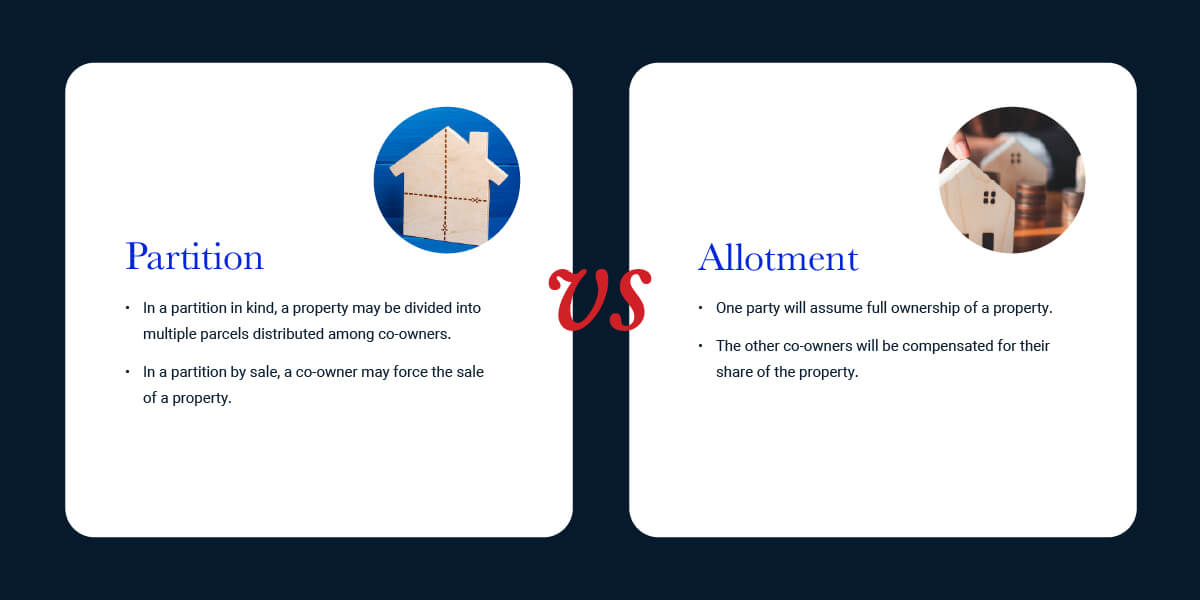McLean Partition and Allotment Lawyers
"I hired Fox & Moghul to sell a joint tenancy property when the other half did not want to sell... I am in a better place today for it & am able to buy another property. Freedom, ease of mind is worth it & there is light at the end of the tunnel!"
Protect Your Investments Contact Our Team Today
The use of the Internet or this form for communication with the firm or any individual member of the firm does not establish an attorney-client relationship. Confidential or time-sensitive information should not be sent through this form.
I have read and understand the Disclaimer and Privacy Policy.
Real Estate Attorneys Addressing Partitions and Allotments of Co-Owned Properties in McLean, VA
Co-owning real estate property can be a practical arrangement for family members, business partners, or investors, but it carries the risk of serious conflict. When disagreements arise over how property should be used, maintained, or sold, tensions can escalate quickly. Disputes between co-owners may need to be resolved through the legal system, and people involved in these cases will need to make sure they have representation from an attorney who is skilled in real estate law.
The lawyers at Fox & Moghul work with property owners in Tysons Corner, helping them address issues related to the co-ownership of property. We can provide guidance on when partition or allotment actions may be used in these cases, and we will ensure that the proper steps are taken to transfer ownership of property, divide a property among multiple owners, or resolve disputes through other methods. We can work to negotiate settlements, or we can provide representation during litigation. We will always fight to protect our clients' rights and help them achieve practical solutions.
Legal Help With Real Estate Ownership Disputes in Tysons Corner
The attorneys at Fox & Moghul can provide clients with strategic legal guidance to resolve disputes among the co-owners of property. We have extensive experience in real estate law and litigation, and we have successfully handled matters involving residential homes, commercial developments, undeveloped land, and inherited real estate.
Our clients can benefit from working with lawyers who understand the nuances of Virginia real estate law and the legal concerns that affect property owners. Our attorneys have been recognized by Virginia Lawyer Magazine as Leading Educators in Virginia Real Estate and Business Law. We provide instruction to other lawyers, including authoring LexisNexis Practical Guidance on "Choice of Ownership Structure of Real Property."
Excellence Always
Common Reasons for Real Estate Co-Ownership Disputes
Co-owners of property may encounter competing interests or changing circumstances that can lead to legal disputes. Some examples of situations that may lead to partition or allotment actions include:
- Inheritances Without a Clear Plan: When family members or other heirs jointly inherit a property, they may disagree over who will live on or use the property, whether they should maintain co-ownership, or whether the property should be rented to tenants or sold.
- Breakdowns of Personal Relationships: Former spouses or partners who purchased property together may no longer wish to co-own a property following the end of their relationship.
- Unequal Contributions or Management: One co-owner may invest more time or money into the property, leading to disputes over compensation, control of the property, or how proceeds will be divided when the property is sold.
- Disagreements Over Sale or Development: One party may wish to sell the property or redevelop it, while the other may want to retain ownership and control of the property without making any changes.
- Failure to Share Costs or Upkeep: If one co-owner has not paid their share of maintenance, taxes, or mortgage obligations, the others may take legal action to address this issue.
In these situations, a partition or allotment action may be the most effective legal remedy. Co-owners may wish to divide the property among them, or one person may wish to assume full ownership. In other situations, it may be beneficial to sell the property and divide the profits among the co-owners.
Partition vs. Allotment: Understanding the Difference
Virginia law provides two general ways to resolve disputes between the co-owners of real estate property:
Partition
In a partition action, one or more co-owners of real estate property may force the sale of the property or divide the property into multiple parcels that will be distributed among the co-owners. There are two primary types of partition:
- Partition in Kind: A property will be physically divided into distinct portions, assigning a share to each co-owner. This option may be used when a property is large enough to be divided or when land is undeveloped.
- Partition by Sale: If the property cannot be equitably divided, or if it would not be feasible for each co-owner to maintain control over a portion of the property, a co-owner may take steps to force the sale of the property. This option may be used in cases involving single-family homes or other buildings.
Allotment
In an allotment proceeding, the court may award full ownership of a property to one co-owner. That party will be required to compensate the other co-owners for their share of the property's fair market value. Allotment may be appropriate when:
- One party resides in the property and wishes to retain ownership
- There is a significant emotional or personal value associated with the property
- The property cannot be easily divided or sold
Determining the Best Path Forward in Disputes Among Property Owners
At Fox & Moghul, we can help our clients resolve co-ownership disputes by performing a careful analysis of a property's characteristics, the ownership structure, and the practical realities involved in ownership and upkeep. We can assist with:
- Reviewing deeds, titles, and ownership records to determine the legal structure of ownership
- Evaluating improvements, liens, and encumbrances that may impact the division or sale of the property
- Handling appraisals and property valuations to assess the property's fair market value
- Determining the feasibility of physical division versus sale based on zoning, access, and usability
- Representing clients in court to advocate for partition in kind, partition by sale, or allotment
In some cases, disputes can be resolved outside of court through negotiated agreements or buyouts. However, when litigation is necessary, our attorneys are fully prepared to represent our clients in court and advocate for their rights and interests.
Contact Our McLean, Virginia Real Estate Attorneys for Partitions and Allotments
If you are involved in a dispute with a co-owner over real estate property, Fox & Moghul can help you protect your property rights and resolve these issues successfully. Whether you believe your property should be divided between you and other co-owners, you wish to buy out the other co-owners' share of the property, or you wish to force a sale, we can advise you of your options and make sure your case will be handled correctly. Contact our McLean real estate partitions and allotments lawyers by calling 703-652-5506 to arrange a consultation.







 Attorney Profile
Attorney Profile


